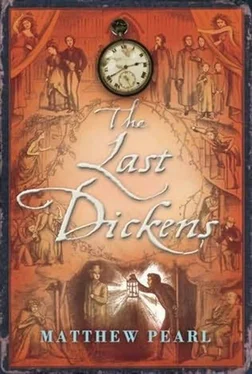“Oh, you are quite right,” Dr. Steele said conclusively. “On their own, the fumes could not do such harm. I hope the lady present will not be too embarrassed,” he said as a caution, and waited for Rebecca to turn away. When she did not, he folded up Osgood's flannel sleeve and revealed what he had seen in his examination.
“I do not understand,” Rebecca protested.
“There,” Dr. Steele said, “a single puncture wound in Mr. Osgood's arm-from a hypodermic syringe. You see it?”
The doctor continued with detached interest. “Someone inserted into your tissue a very high dosage of the narcotic, sir. That is why it has required a long time to be ejected from your body.”
Rebecca felt herself shaking. Osgood sat bolt upright. They caught each other in a mutual moment of unreserved shock. They had come halfway around the world, in part in an effort to leave Daniel's tragedy behind and yet came round to face the same poisonous injection marking in Osgood's own skin as Daniel had suffered. Everything seemed to be brought into a single line of sinister action, though why and where it had all started was more of a mystery than ever.
Rebecca knew that if Dr. Steele believed any conversation overexcited the patient he would intervene to end it. So she waited, pretending to the best of her ability that the puncture wound was the least interesting sight ever witnessed. The doctor soon moved into the next room, giving long-winded instructions to a messenger boy to secure more vials of medicine from the town druggist.
“Mr. Osgood, is it the same as what you saw on… on Daniel's body?” Rebecca asked in as calm a whisper as she could manage, so the doctor could not hear them from outside the door. “You mustn't hold anything from me. It is, isn't it?”
“Yes,” Osgood whispered in return.
“What could it mean?”
“We have faced the same adversary since the morning of Daniel's death.”
“But who?”
“I don't know.” Then Osgood whispered half brokenhearted and half triumphant, “It wasn't Daniel who injected himself with opium. We know that now for certain. He was poisoned, Miss Sand, just as I was!”
“Do you believe that?”
“It must be! Dickens himself could not write such a discovery as coincidence! This knocks the wind out of the whole thing. We must seek a clearer view of everything: of Daniel, of the opium fiends, of Brood. Miss Sand,” he added with an abrupt urgency. “Miss Sand, some paper!”
Rebecca brought him hotel stationery and a lead pencil and a book to rest them on.
Osgood wrote on the stationery, crossing words out then trying again until he got it:
It is God's.
Itisgod's.
ItsOsgoods. It's Osgood's.
Daniel Sand didn't exclaim a sentiment of religious peace, but the words carried a beautiful meaning nonetheless. “Look,” he said. “Bendall was wrong. Daniel didn't leave out a final word before he died. Daniel didn't want me to be angry, even at the edge of life. He never failed the firm at all.”
When Dr. Steele came back to complete his examination, the darkness of the room hid the hot tears in Rebecca's eyes.
IT HAD NOT ONLY been Osgood's physical but his legal standing that had been in jeopardy the balmy morning of the attack. When he had first partially recovered his senses, he had found himself carried out of the sewer tunnels by two toshers, the sewer hunters, to a police station house. He could not explain to the constables how he had come to be there.
Moreover, Osgood's state at the time-his now-tattered and wet clothing, his slurred speech and senses, and the harsh smell of burned narcotics and rubbish-subjected him to reproach by the officials as if he were another bothersome tosher. When he described what had happened, other constables were dispatched and the dead bodies of a Lascar sailor and a Bengalee known as Booboo by local residents were found in the squalid rooms described by Osgood.
“That is not good for us,” the station sergeant said to Osgood. “Not good for you, sir. Your story is not complete.”
“Because I know not what has happened to me, sir!” Osgood protested.
“Then who would?” the sergeant demanded.
Only the arrival of a respected London man of business, Marcus Wakefield, had saved him from being charged as a public nuisance. Mr. Wakefield had been alerted about the presence of an unknown American brought to the station house because Osgood had had Wakefield's calling card on his suit when he was found.
“You know this poor soul, sir?” the sergeant asked skeptically. “Or perhaps he stole your card from your possession.”
Osgood was stretched out on a bench, mangled with pain and delirium.
Wakefield slammed his fist against the table. “This is outrageous! Release him straightaway, gentlemen. I crossed the ocean with him- his name is Osgood, James Osgood. He is no vagrant at all but a respected publisher from Boston who preferred a cabin on the sunny side of a steamship. You have a gentleman in your custody. It was my understanding he was to be residing in the country near Rochester conducting his business.”
The sergeant looked Osgood up and down. “I have never met a publisher that would choose to dress and, shall I mention, stink like that, sir! We shall have to write a report.”
“Write your report, then let him free.”
Wakefield used his influence to expedite Osgood's liberty and then sent a message to Rebecca summoning her to Higham station, where Wakefield met her with Osgood so the injured man could be transported back to the Falstaff Inn to recover. When they met at the station, Wakefield asked to speak with Rebecca alone.
“May I walk with you, my dear?” said Wakefield.
Rebecca held out her arm for their visitor as they walked through the station.
“My dear, I would continue with you to the Falstaff but I am afraid I must return to London at once on business,” he said apologetically.
“You have been very kind to bring him all the way back to Kent, Mr. Wakefield,” she replied.
He shrugged. “I confess that although I am horribly alarmed by Mr. Osgood's surprising state and these circumstances, I take solace in the pleasure I feel to be in your company again,” he said. “And are you well, my dear?”
“As well as I can be, thank you, Mr. Wakefield,” Rebecca said politely. “I only wish I had not permitted Mr. Osgood to go to such a place with that awful Mr. Datchery.”
“I am afraid the tender woman, though she must try, cannot prevent the less cautious sex from our imprudent pursuits, Miss Sand,” said Wakefield, smiling. “Mr. Osgood, it seems, has discovered, too late for his health, that all of London is not a picnic. Women's instincts are often right. Mr. Osgood had sent me a note about some matter with a plaster statue at Christie's auction house that he suspected had gone missing. I inquired about it with an associate-apparently this statue your employer was interested in was dropped by a careless workman at the auction house and, embarrassed, they did not want to reveal it. I hope you insist on him suspending these wild activities in such dark corners, whatever they may have been.”
Rebecca shook her head. “I do not know that anyone in the whole world could sway him now. Perhaps not even Mr. Fields.”
Wakefield sighed worriedly but with a note of admiration. “He is a man of inner resources, I can see that, and confess it is like looking in a mirror. I did not know being a publisher carried with it such adventures! I suggest you keep a most watchful eye on him from now on, my dear Miss Sand. I have friends up and down the city. Send for me at the slightest worry. As a businessman, I fear I know too well that whatever flame of ambition fires Mr. Osgood's heart, it will not soon be extinguished unless his goal is attained.”
Читать дальше












